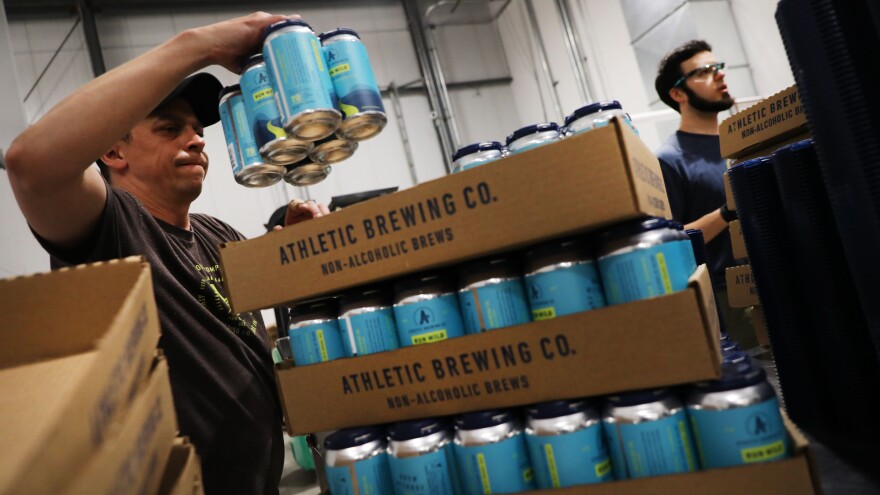Craft nonalcoholic IPAs. Kentucky 74 spiritless bourbon. Monday Zero Alcohol Gin. Luminara alcohol-removed chardonnay. Zero-proof margaritas.
It doesn't seem that long ago when O'Doul's, a stodgy nonalcoholic beer, was basically the only buzz-free game in town. But now, if you like the taste of alcoholic drinks but don't like the effects of alcohol, you're living in a golden age.
The business of nonalcoholic beer, wine and spirits is booming. In the last year, "more than 70 new items have been launched in this space as consumers seek out health and wellness alternatives in their drinking routines," says Kaleigh Theriault, a representative from NielsenIQ, a data analytics company.
NielsenIQ's data shows the market for nonalcoholic beer, wine and spirits grew more than 20% last year — and more than 120% over the last three years. The market now sees almost $400 million in annual sales. Compared to the roughly $200 billion market for stuff that can get you drunk, that's, of course, peanuts: nonalcoholic alternatives are only about 0.47% of the alcohol market. But alcohol companies, entrepreneurs and an increasingly long list of celebrities clearly see much more room for growth.
Over the last couple years, Katy Perry launched De Soi, a nonalcoholic sparkling apéritif; supermodel Bella Hadid co-founded Kin Euphorics, which offers nonalcoholic drinks like Dream Light, "infused with adaptogens, nootropics, and botanics like Reishi Mushroom, Melatonin, and L-Tryptophan"; and NFL defensive end J.J. Watt and chef David Chang invested in Athletic Brewing Co., a nonalcoholic craft brewery.
Budweiser recently used the World Cup (hosted by anti-alcohol Qatar) to promote Budweiser Zero, which, as the name suggests, has zero alcohol.
Megan Klein, an entrepreneur in the nonalcoholic booze market, told Marketplace last year that she sees this consumer trend — sometimes called the "sober curious" movement — as one part of a growing "anxiety economy." That's a label for a set of products — like meditation apps, squishy stress balls, self-help books and online psychiatry services — that are benefiting from increasing numbers of folks striving for lower levels of anxiety and better physical and mental health.
[Editor's note: This is an excerpt of Planet Money's newsletter. You can sign up here.]
Of course, instead of imbibing one of these new-fangled liquid concoctions, you could simply drink juice or water. But you may legitimately like the taste of beer, wine and spirits. Moreover, alcohol plays this almost ceremonial role in our festivities and social gatherings — as it has for thousands of years. These nonalcoholic alternative drinks offer consumers a way to sip something festive while avoiding the pitfalls of alcohol; or at least reduce their overall alcohol consumption.
An alcohol substitute or complement?
At first blush, faux alcoholic beverages seem to be — to use econospeak — a substitute for real-deal alcoholic drinks. In this view, consumers drink them instead of alcoholic drinks, and because of that, their demand for alcoholic drinks naturally goes down. This is probably the case for many consumers.
But it's also possible that, for some people, nonalcoholic beverages are not a substitute. They could be a complement — which is econospeak for consumer goods that are often purchased together, like peanut butter and jelly. NielsenIQ's data suggests this may indeed be the case. It finds that 82% of people who buy nonalcoholic beers, wine and spirits also buy traditional alcoholic drinks.
Furthermore, NielsenIQ finds, the households that buy alcohol alternatives are overall more valuable consumers for the alcoholic industry, spending roughly $160 million more per year than households that only buy the stuff that gets you tipsy. Manufacturers and bars, Theriault says, may be using alcohol alternatives as "a way to promote responsible drinking while still engaging consumers with the alcohol industry."
So whether you're kicking "the giggle juice" for health reasons or you just want to cut back this month, there have never been so many options for Dry January. Cheers!
Copyright 2023 NPR. To see more, visit https://www.npr.org.




